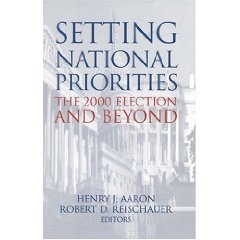The public policy overviews by Brookings are always among the best, and they are even more valuable this year when several think tanks appear to have defaulted on their traditional role in offering up reviews for consideration by the transition team. Across the various issue areas, including international, social, domestic, and governance policy domains, they present thoughtful recommendations.
Unfortunately, despite their deep understanding of the dilemmas facing the next President, the book does not provide the two things I would most like to have seen: one or two page “decision-papers” that set out the choices to be made within each issue area, and the specific budget costs and timelines for those choices; and a larger over-all budget choice document in no more than 2 pages that outlines what changes might be made in both the budget construction already underway in CY 2001 that the new President can influence, and the budget to be prepared from scratch in CY 2002 that should reflect the vital trade-offs as well as the vital plus-ups that need to be made in defense, intelligence, public health, and education, to name just my top four. In defense and intelligence, my specific area of interest, I would have liked to see some specific recommendations, and their costs, for restoring the 450 ship Navy, creating the contingency and peacekeeping force as well as the humanitarian assistance and disaster relief forces, and some specifics on considerably reinforcing diplomatic, peace corps, and economic assistance operations including a Digital Marshall Plan. This is not to quarrel with findings and views of the authors, all of whom merit very serious consideration, but rather to note that the book does not go far enough, either in specific programmatic terms, or in politically useful presentation terms.
This is an excellent book, but it is also a classic example of unfettered brilliance-without the concise decision papers and the over-all budget numbers, this book will only be read by staffers, not by principals, and that is a shame, because on balance I think there is a great deal to be learned from each of the authors contributing to this work.



